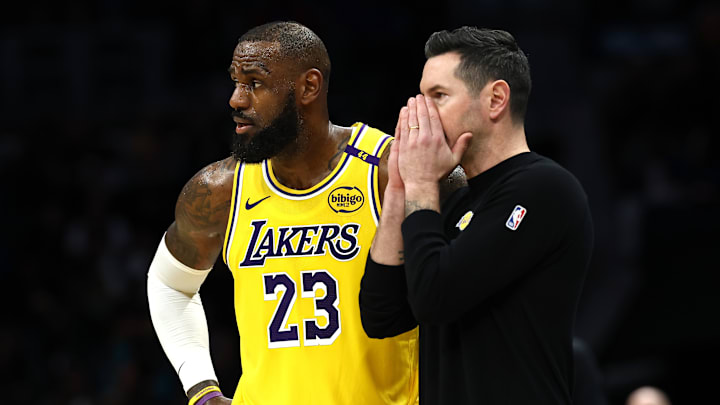The Los Angeles Lakers tied their first-round series at one game apiece, but the most revealing part of Game 2 wasn’t on the scoreboard. It was in the dynamic between the team’s superstar and its rookie head coach.
LeBron James continues to steer the Lakers’ identity from the floor, sticking with a small-ball strategy that had been thoroughly exposed in Game 1. Instead of adjusting, the team doubled down on what many considered a flawed approach.
That decision was a clear signal that LeGM, not JJ Redick, is shaping how this team plays. The Lakers made no significant changes after being dominated by Minnesota’s size. They simply returned with the same structure, only with more energy, sharper execution, and a higher level of urgency. It was a psychological adjustment, not a tactical one. That gamble paid off in Game 2, but the question looms: can this version of the Lakers last deep into the playoffs?
LeBron's intensity sets the standard—but it’s draining
LeBron James leads with expectation. He demands the best from those around him—not just physically, but mentally. His leadership style is grounded in elite discipline, where details matter and mistakes are rarely excused.
For years, this approach has delivered results, but it also carries a toll. Former teammate Richard Jefferson once described their 2016 championship run in Cleveland as one of the most exhausting times in his life. He wasn’t talking about the games—he was talking about the day-to-day grind of matching LeBron’s unrelenting focus.
That culture of constant pressure is part of why the Lakers won Game 2. They played as if it were a do-or-die moment, and mentally, maybe it was. But there’s a downside. Game 2—on home court, in the first round—already felt like a finals game.
If this level of mental effort is required just to stay afloat early, what happens when the Lakers face teams like the Denver Nuggets or the Boston Celtics? Championship teams pace themselves. Right now, the Lakers are sprinting.
JJ Redick isn’t just the messenger—he’s the coach
As the Lakers stumbled through the third quarter of Game 2, something shifted. Not on the court—but on the sideline. JJ Redick erupted during a timeout, delivering what LeBron later called a “spazz out.”
The moment went viral, but it wasn’t about style. It was substance. The team responded. And while LeBron later brushed it off with a comparison to his high school coach, the truth was evident: in that moment, the Lakers needed their head coach to take control.
It was a defining flash of Redick’s role—not as a figurehead, but as a leader. He may be in his first year, but he’s not here to just deliver motivational speeches. He was hired to implement strategy, manage egos, and make tough calls.
And when belief alone wasn’t cutting it, it was Redick’s fire that reignited the group. It’s time to stop underestimating what he brings. The Lakers can’t afford to rely solely on LeBron’s emotional leadership. They need tactical flexibility, real-time adjustments, and someone who sees the full picture from the bench.
One clear example: the near absence of LA’s traditional bigs. Players like Jaxson Hayes or Alex Len have seen severely limited minutes, despite the clear mismatch against Minnesota’s size. It may seem like blasphemy to question LeBron’s plan, but at some point, size does matter—especially when facing Gobert or Randle.
Redick, if given more strategic autonomy, may need to assert that not all games can be won on belief and small ball alone, although the Lakers have, with Doncic and James, two of the players in the league.
Game 3 will test the Lakers’ belief—and balance
Now the series moves to Minnesota, and the Lakers face their biggest test yet. The Timberwolves are bigger, younger, and energized by a home crowd ready to swing the series back in their favor. They will try to bully the Lakers on their home court.
For LA, this isn’t just a road game—it’s a referendum on how far mental toughness alone can carry them. If they fall behind early, or if shots stop falling, we’ll see whether Redick’s message still gets through—or whether the weight of LeBron’s standard becomes too heavy.
The Lakers are committed to small ball. That’s no longer a strategic wrinkle—it’s the identity. But by continuing to limit the minutes of their few available bigs, they’re denying themselves a potentially crucial tool. Every playoff team left has the personnel to punish predictability, and Minnesota already has. The more LA shrinks, the more vulnerable they become.
Game 3 is the fork in the road. Win, and the Lakers seize control of the narrative and maybe even the series. Lose, and they risk letting effort turn into exhaustion—and leadership into limitation. LeBron’s blueprint might be powerful, but without JJ’s tactics, size, and adaptability being allowed to matter, this run could end long before the Finals stage.
